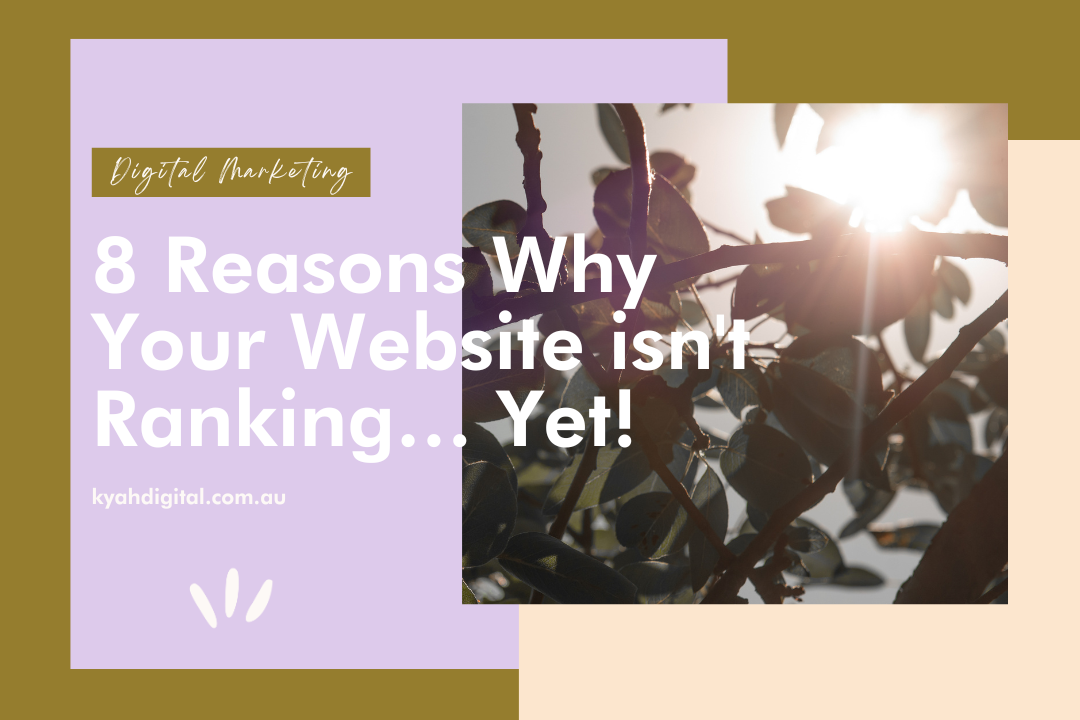Why Your Website Isn’t Ranking: 8 Ranking Roadblocks
You've poured your heart and soul - and possibly a huge chunk of change - into your website. The colour scheme is on point, the copy is compelling, and the visuals are stunning. You’re proud as punch of your brand spankin’ new website.
But despite all your hard work, your site still isn't showing up on Google. Frustrating, right? It's like you're shouting into the void “Hello! Is anyone there? Does anyone even know I'm here?"
You're not alone in your frustrations. Many of my clients have said the same thing to me. And while that thought alone doesn’t make the frustration go away, hopefully a better understanding of why your site isn’t ranking may.
Let’s explore some of the reasons why your website might not be ranking as well as you’d like… yet!
#1. Your Website is New
This is generally the number one reason why your website might not be ranking.
If your website is still fresh out of the oven, be patient. Search engines need time to discover and index new sites. It might take weeks or even months for your site to start appearing in search results. Frustrating? Yes. Just the way it works? Also yes.
#2. Search Engines are Blocked
Sometimes, in our haste to go live, we might accidentally block search engines from crawling our site. Make sure you haven't set any restrictions in your site or page settings that could be preventing search engines from indexing your content.
#3. Your Keywords are Highly Competitive
If you're targeting really popular (read: competitive) keywords, your website will be competing against a lot of well-established websites for those coveted ranking spots. Competing with industry giants can be really tough, and it could take a really long time for your website to rank well for keywords that are highly competitive, so it’s important to also focus on niche keywords where you have a better chance of standing out.
#4. Your Keywords are too General
General keywords might have high search volumes, but they also come with stiff competition. They might not even match what your target audience is specifically looking for. For example, you might sell sneakers for kids. But if you target just the keyword “sneakers” you might get people who are looking for sneakers for adults, aka, not your customers. You want to aim for long-tail keywords that are more specific to your products or services, like “casual sneakers for kids” or “sneakers for girls”.
#5. Your Website is Slow
A slow-loading website is a major turn-off for both users and search engines. Google prioritises sites that load quickly, so optimising your site's speed is critical. This could mean compressing images, leveraging browser caching, or upgrading your hosting plan. In my post SEO Best Practice: 8 Tips to Make SEO Easier for You, I outline how you can optimise your website - and in particular your images - to improve your site speed.
#6. Your Site is not Mobile-Friendly
With more people browsing on their phones, having a mobile-friendly website is no longer optional,it’s a must. Search engines favour sites that are optimised for mobile devices, so make sure your website is responsive and works well on all screen sizes. If your website was built using Squarespace, you can easily toggle to view your site in mobile or tablet view, and then make adjustments to your design to ensure it works well on different screen sizes.
#7. Duplicate Content
Having the same content across multiple pages can confuse search engines and dilute your ranking potential. You want to ensure that each page of your site has unique, valuable content that serves a specific purpose.
#8. Poor User Experience
If your website is difficult to navigate, cluttered, or if users are bouncing off quickly, search engines will take notice. A high bounce rate can signal - to search engines - that your site offers a subpar user experience, which can harm your rankings. You want to ensure that your site is user-friendly and engaging to improve user satisfaction and boost your visibility online.
The Good Stuff
It isn’t all doom and gloom over here. I like to end things off on a good note.
Just because you Googled your business name or a keyword you want to rank for you and you don’t see your site, doesn’t mean your website isn’t ranking. Search engine rankings are very fickle beasts and change based on so many factors, including your own location, search history and so on. So you could be ranking and not even know it. There are tools you can use - like Google Search Console (it’s free!) to see exactly how your site is performing. Use these tools to gain insights into which keywords are bringing in traffic and see where you may have room for improvement.





